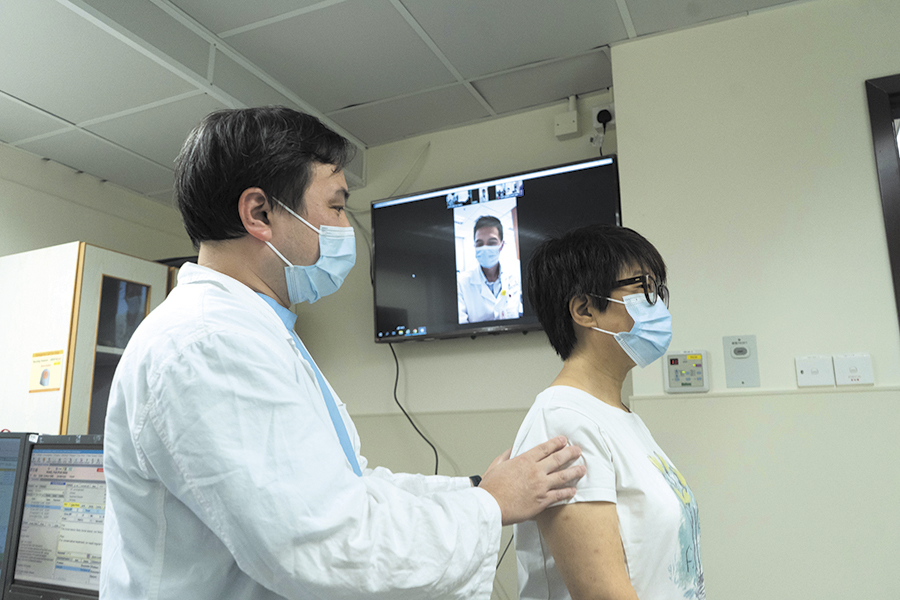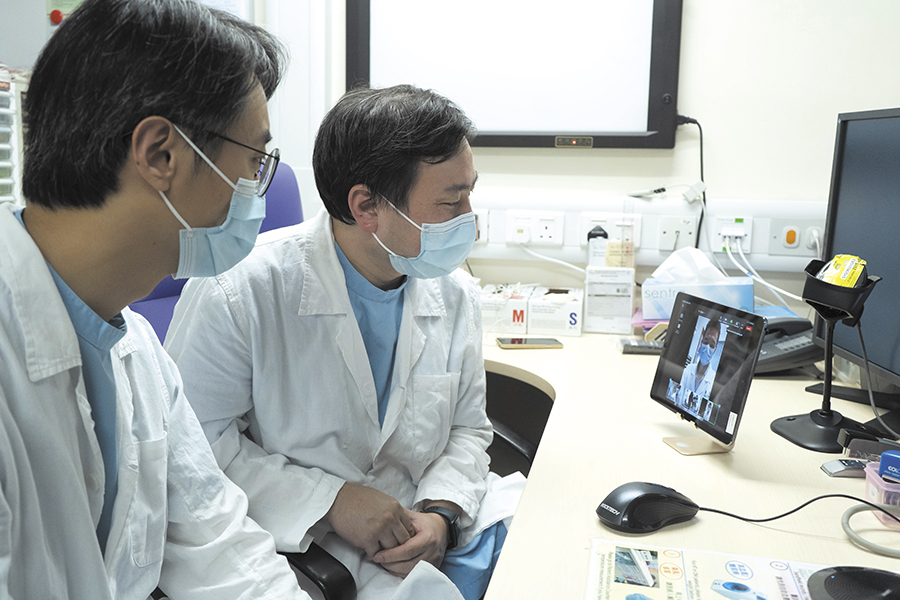An immersive Ortho-FM combined tele-consultation clinic
 While the COVID-19 epidemic has led to the inevitable postponement of some non-emergency clinical services, it has also paved the way to explore different innovative ways to maintain high quality and effective medical care, like tele-consultation. Since May 2022, the Hong Kong West Cluster (HKWC) Family Medicine Specialist Clinic (FMSC) and Orthopaedics Specialist Out-patient Clinic (SOPC) have jointly commenced a pilot scheme for a combined Ortho-FM tele-consultation clinic. Under this pilot scheme, FM specialists examine patients in a designated clinic while orthopaedists provided consultations via a real-time online connection. This collaborative model not only broke free of the constraints of traditional cross-specialty referrals, but also allowed patients to be evaluated by specialists within a significantly shorter waiting period.
While the COVID-19 epidemic has led to the inevitable postponement of some non-emergency clinical services, it has also paved the way to explore different innovative ways to maintain high quality and effective medical care, like tele-consultation. Since May 2022, the Hong Kong West Cluster (HKWC) Family Medicine Specialist Clinic (FMSC) and Orthopaedics Specialist Out-patient Clinic (SOPC) have jointly commenced a pilot scheme for a combined Ortho-FM tele-consultation clinic. Under this pilot scheme, FM specialists examine patients in a designated clinic while orthopaedists provided consultations via a real-time online connection. This collaborative model not only broke free of the constraints of traditional cross-specialty referrals, but also allowed patients to be evaluated by specialists within a significantly shorter waiting period.
Ms Hung – one of the first batch of patients to benefit from this pilot scheme – had already been suffering from back pain for six months. During the real-time tele-consultation, Dr Paul Koljonen, Associate Consultant of Department of Orthopaedics & Traumatology of Queen Mary Hospital, assessed her condition together with Dr Stephen Chou and Dr David Cheng, Associate Consultants of Department of Family Medicine & Primary Healthcare of HKWC. Together they reviewed Ms Hung’s X-rays and CT scans, and Dr Koljonen provided an orthopaedic consultation while Dr Chou and Dr Cheng examined Ms Hung’s back and shoulder to confirm where the pain was. Ms Hung was reassured that there was no sinister pathology requiring intervention. It was no longer necessary for further orthopaedic SOPC referral.

Help patients understand their condition as early as possible
Ms Hung was relieved to be reassured of the benign nature of her back pain, and was pleasantly surprised at the efficiency of the clinic. “The doctors in the clinic examined me carefully, and they were all able to answer all my questions in detail. It made me feel much more comfortable,” she reflects. “As a patient, I certainly want to understand my condition. It’s worth implementing tele-consultation in more places if it means patients can see specialists earlier.”The Ortho-FM joint consultation service was first introduced in 2016, in which FM specialists provided consultation together with orthopaedists in the FMSC. “Unfortunately, the service had to be suspended during the fifth wave of the epidemic,” Dr Chou explains. “Now, the introduction of tele-consultation allowed us to resume the combined services.” Dozens of patients with pain issues or orthopaedic problems have since taken advantage of the combined tele-consultation service, which allowed them to have a consultation within only one to two months of waiting time.
“Although the orthopaedists is only assessing the patient online, their good cooperation with the primary care physicians allows necessary physical examinations to be carried out, and their Clinical Management System connection ensures that all radiological images and laboratory results can be clearly reviewed,” Dr Chou continues. “As this model of tele-consultation becomes more mature with practice, in the future we will be able to handle other conditions and diseases in this way, and hopefully shorten waiting time and avoid unnecessary SOPC referrals.”